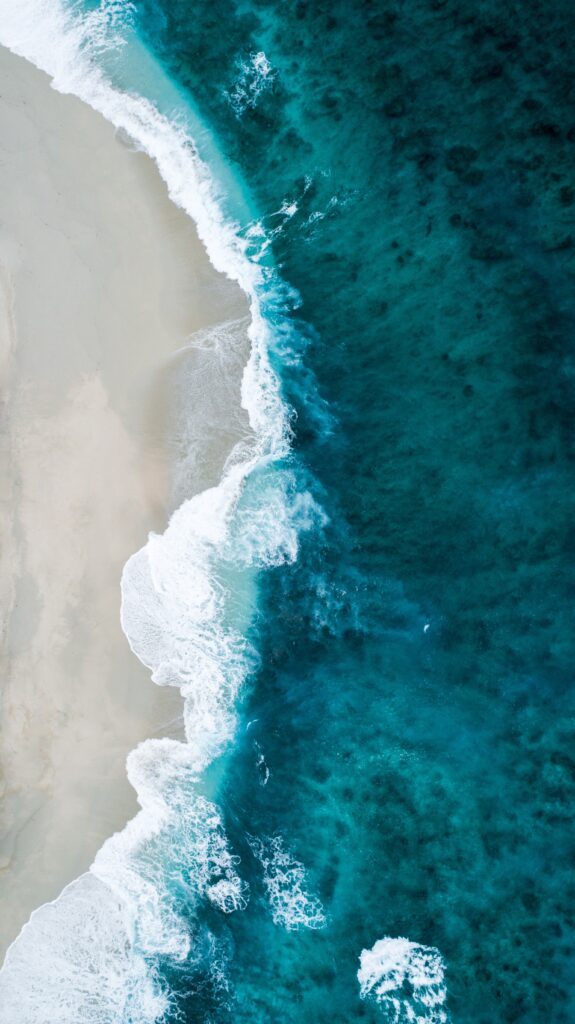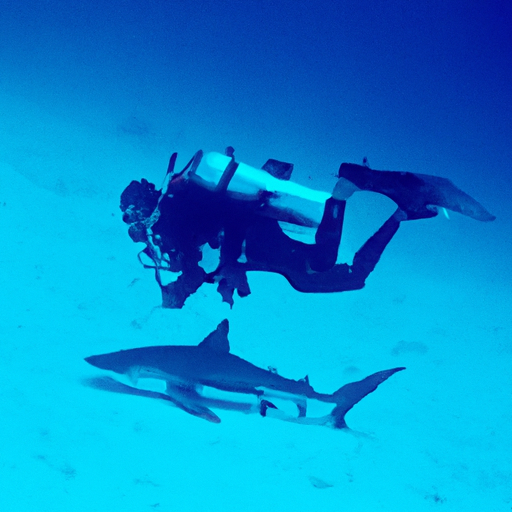Imagine swimming in the deep blue ocean, surrounded by mysterious creatures and hidden wonders. You might ask yourself, why are divers not attacked by sharks? It’s a question that has intrigued marine biologists and adrenaline-seeking adventurers alike. In this article, we will explore the fascinating reasons behind this seemingly paradoxical phenomenon. Brace yourself for a thrilling exploration into the underwater world’s unspoken secrets and discover the unique relationship between divers and sharks. Get ready to unlock the truth about our coexistence with these majestic predators.

Camouflage
Diver’s wetsuits resemble predators
When you’re diving in the ocean, one of the reasons why sharks typically do not attack divers is because our wetsuits resemble the appearance of their natural predators. These sleek and dark wetsuits mimic the patterns and colors of larger marine animals, such as seals or other predatory fish. From a shark’s perspective, this may cause confusion and hesitation before they make a move, as they need to assess whether the potential prey is worth the effort and risk.
Reef diving offers camouflage
Another advantage for divers when it comes to avoiding shark attacks is the underwater environment itself. Reef diving often provides divers with the opportunity to blend into their surroundings, thanks to the vibrant and diverse marine life. The intricate patterns, textures, and colors of the reef can help to camouflage divers, making it harder for sharks to distinguish them as separate entities. This camouflage effect provides an added layer of protection as divers explore the underwater world.
Blue dive gear may appear unappetizing
Additionally, the choice of dive gear color can also play a role in minimizing the risk of shark attacks. Sharks tend to associate the color blue with a less appetizing food source. By sporting blue dive gear like wetsuits, fins, and other equipment, divers create an appearance that is unappetizing to sharks. This color choice, combined with the shapes and patterns of the gear, may deter sharks from approaching, reducing the chances of an accidental encounter or attack.
Misidentification
Sharks may mistake divers for seals
In certain instances, when divers are swimming at the surface, they may be mistaken for seals by sharks. From below, the shape of a diver can resemble a seal in the water, with similar torso and limb movements. However, once the shark comes closer and properly assesses the situation, they usually realize that humans are not actually their preferred prey. This misidentification is more common near the surface, and as divers descend deeper, the risk of being mistaken for a seal decreases significantly.
Divers resemble the shape of sea turtles
Similarly, divers can occasionally appear similar in shape to sea turtles, especially when wearing scuba equipment that may provide some bulkiness. Sea turtles are not typically targeted by sharks as prey, so this resemblance can work in divers’ favor. Sharks may approach divers out of curiosity, but their innate instincts will often recognize that divers do not possess the characteristics of the prey they are seeking.
Bubbles and fins disrupt shark’s visual perception
Another reason why divers are generally not targeted by sharks is the presence of air bubbles and the motion of diving fins. Bubbles created by breathing apparatuses and the movement of fins can potentially disrupt the sharks’ visual perception. The bubbles and fin movements may confuse or startle the sharks, making them unsure of what they are encountering. As a result, sharks may choose to keep their distance, minimizing the likelihood of an aggressive or predatory interaction.
Noise and Vibration
Divers tend to make less noise underwater
When you’re diving, one advantage you have is the ability to make less noise underwater compared to other water activities like swimming or surfing at the surface. Sharks have an acute sense of hearing, and any sudden or loud noises can startle them or draw their attention. Divers, by virtue of their specialized equipment and underwater movements, create relatively minimal noise in the water. This reduced noise level helps to prevent sharks from being alerted to their presence and reduces the chances of an encounter or attack.
Vibrations from diving equipment may deter sharks
In addition to minimizing noise, the vibrations caused by diving equipment can also serve as a deterrent to sharks. Sharks have an incredible ability to sense vibrations in the water, which they use to locate and track their prey. The vibrations generated by divers’ movements and equipment can alert sharks to their presence. However, the vibrations may also convey signals that the divers are not suitable prey or pose a potential threat. These vibrations, combined with the lack of prey characteristics, can contribute to the overall avoidance of sharks towards divers.
The sounds made by divers resemble bigger marine species
Furthermore, the sounds produced by divers while underwater can often resemble the noises made by larger marine species. In the underwater world, there are various creatures like dolphins, whales, and larger fish that emit specific sounds, such as clicks, grunts, or vocalizations. Divers unintentionally produce similar noises through their equipment and movements, which can indicate the presence of potentially larger and more challenging marine creatures. By mimicking these sounds, divers may discourage sharks from approaching, as they may mistake divers for more formidable targets.
Deterrents and Defense
Divers use shark repellents
Divers have access to various shark repellent devices that can assist in deterring sharks. These devices work by either emitting specific sounds or electrical signals that create discomfort or confusion for sharks. Some repellents emit low-frequency sounds that mimic those made by orcas, known as killer whales, which are natural predators of sharks. Other devices use electrical fields to generate an unpleasant sensation for sharks, causing them to avoid the area altogether. While these repellents do not guarantee complete protection, they can serve as an additional layer of defense for divers.
The presence of other marine life deters sharks
When diving, the presence of other marine life, such as schools of fish or dolphins, can act as a natural deterrent for sharks. Many sharks prefer to avoid areas where other marine animals are in abundance, as it increases the chances of encountering competition for food or potential threats. Divers benefit from this natural behavior, as the company of other marine species can create an environment that discourages sharks from approaching. This indirect defense mechanism helps to minimize the risk of shark encounters.
Divers carry protective devices
Additionally, divers often carry defensive tools, such as knives or spears, as a precautionary measure. These devices are not intended for aggressive encounters with sharks but serve as a last resort option in case of an emergency situation. If a shark were to display unusually aggressive behavior or pose an immediate threat, divers can utilize these tools to create a physical barrier and give them a chance to safely distance themselves from the shark. However, it is crucial to note that such situations are extremely rare, and divers are typically encouraged to maintain a respectful distance from marine life.

Diving Habits
Divers usually do not bleed in the water
One factor that contributes to the minimal risk of shark attacks during diving is the absence of blood in the water. Sharks have highly developed senses, particularly their ability to detect blood and trace it back to its source. Divers generally do not bleed in the water unless an unfortunate accident occurs. This lack of blood reduces the likelihood of sharks being attracted to divers, as they primarily rely on their extraordinary sense of smell to locate potential prey.
Diving activities often take place during the day
Another reason why divers are generally safe from shark encounters is the timing of their activities. Diving expeditions typically take place during the day when visibility is better, and there is an abundance of natural light. Sharks are more active during dawn and dusk when they have a tactical advantage in low-light conditions. By diving during daylight hours, divers reduce the likelihood of surprise encounters with sharks and increase their own ability to spot and avoid any potential threats.
Divers are usually in groups
Furthermore, when divers explore the underwater world, they often do so in groups. The presence of multiple divers not only enhances safety through increased vigilance and collective awareness but also lowers the risk of individual divers being mistaken for solitary prey. Sharks tend to target solitary animals more frequently, as they are seen as easier targets. When divers are surrounded by their companions, sharks are less likely to approach, as the group dynamic creates a larger and potentially more challenging entity to engage with.
Shark Behavior
Sharks don’t see divers as prey
Contrary to popular belief, sharks do not view divers as prey. While they may approach out of curiosity or investigate what they perceive as potential food sources, their interactions with divers are often driven by curiosity rather than predatory instincts. Sharks have evolved over millions of years and have highly specialized senses and instincts that enable them to identify suitable prey items. Divers, with their equipment and behavior, do not resemble the characteristics of their preferred prey, leading sharks to recognize divers as something outside their regular prey category.
Shark attacks are extremely rare events
Shark attacks on divers are incredibly rare occurrences. Despite the sensationalized media coverage, the statistical likelihood of a shark attacking a diver is exceedingly low. Sharks have an inherent hesitancy towards engaging with humans, as they rely on natural prey items that are more plentiful and readily available. It is important to remember that these apex predators play a crucial role in maintaining the balance of marine ecosystems and rarely pose a substantial threat to divers.
Sharks have no inherent aggression towards divers
It is essential to understand that sharks do not possess any inherent aggression towards divers. While they may display territorial behavior or aggression in response to threats, this is generally reserved for their interactions with other sharks, competing for resources, or during mating rituals. Sharks do not view divers as competitors or potential mates, and therefore, their behavior towards divers is typically non-confrontational. With a sound understanding of shark behavior and proper diving practices, divers can coexist peacefully and respectfully with these magnificent creatures.

Diving Locations
Popular diving spots have well-fed shark populations
Many popular diving locations around the world are known for their abundant shark populations. These areas often have well-established ecosystems with healthy populations of their natural prey, such as fish, turtles, or seals. Sharks are drawn to these locations due to the availability of food, making them less likely to view divers as potential prey. The presence of abundant prey ensures a stable food source for the local shark populations, decreasing the likelihood of any predatory interactions with divers.
Sharks are aware of the human presence in dive sites
Sharks are highly perceptive animals and have demonstrated an awareness of human presence in dive sites. Over time, they become accustomed to the regular activities and movements associated with divers and boats. This familiarity leads to a decreased level of apprehension or curiosity towards divers, as sharks recognize that humans are not a substantial threat. The coexistence between sharks and divers in these locations is a testament to the adaptability and understanding of these remarkable creatures.
Sharks are habituated to boats and divers
Due to the extensive human interaction in certain dive sites, sharks have become habituated to the presence of boats and divers. These encounters occur with a level of frequency that allows sharks to discern the difference between potential prey and non-prey items. Divers benefit from this habituation, as it results in reduced curiosity-driven encounters and a generally relaxed interaction with sharks. While caution and respect are vital to maintaining a safe diving experience, the prevalence of habituated sharks contributes to the overall safety of divers in these areas.
Water Visibility
Limited visibility hinders shark’s hunting ability
Limited visibility underwater can pose challenges for sharks in their hunting endeavors. The murkiness or turbidity of the water can impede their visual perception and tracking abilities. Divers benefit from this limitation, as reduced visibility makes it more difficult for sharks to accurately identify or locate potential prey. By ensuring their own visibility is maximized through the use of lights and clear water conditions, divers can minimize the likelihood of inadvertent encounters with sharks.
Divers can spot and avoid sharks easily
In waters with good visibility, divers have the advantage of being able to spot and identify sharks at a distance. Sharks are often curious creatures themselves and may approach divers out of curiosity. However, divers’ ability to detect sharks early on allows them to take appropriate measures to avoid any potential conflict and maintain a safe distance. This increased visibility empowers divers to proactively manage their interactions with sharks and mitigate risks effectively.
Scuba bubbles can act as a visual deterrent
The release of scuba bubbles during diving acts as an additional visual deterrent for sharks. As the bubbles rise to the water’s surface, they create movement and disturbances in the water column. Sharks, being sensitive to sudden changes in their environment, may interpret these bubbles as a potential threat or disturbance and avoid the area. The presence of scuba bubbles can act as a deterrent, contributing to the overall safety of divers by ensuring that sharks maintain a respectful distance.

Shark Feeding Behavior
Sharks tend to avoid divers during feeding times
Sharks typically exhibit different behavior patterns during feeding times. While individual species may display variations, many sharks become singularly focused on hunting and consuming their natural prey during specific periods. These feeding times often correlate with specific environmental cues, such as changes in daylight or tidal patterns. Divers are usually aware of these feeding times and ensure they do not dive during those periods, reducing the chances of accidentally encountering sharks during their feeding frenzy.
Divers do not usually display characteristics of prey
Another reason why divers are not commonly targeted by sharks during feeding times is due to their behavior and lack of characteristics associated with prey. Divers do not display the erratic swimming patterns or vibrations that sharks often associate with injured or distressed prey. By maintaining buoyancy control, remaining calm, and exhibiting controlled movements, divers are less likely to trigger predatory responses from sharks. This understanding of shark feeding behavior and responsible diving practices greatly reduce the risk of unwanted shark encounters.
Sharks prefer natural prey items
Sharks have finely tuned senses that enable them to identify and select their preferred prey items. Each species of shark has its own set of ecological roles, behavioral patterns, and dietary requirements. They rely on their senses, such as smell, sight, and electrical detection, to locate suitable prey. Divers do not possess the sensory cues that sharks use to identify their natural prey, making them less attractive targets. The absence of characteristics specific to sharks’ preferred food sources further decreases the likelihood of an aggressive encounter between divers and sharks.
Shark Encounters
Sharks exhibit avoidance behavior towards divers
When it comes to interactions between divers and sharks, sharks generally exhibit avoidance behavior. Sharks have evolved to recognize and assess potential threats or competition, and they avoid engaging unless necessary. Similarly, when sharks encounter divers, they often perceive them as unconventional and uninteresting objects. In most cases, sharks maintain a respectful distance or merely observe the activities of divers out of curiosity. This avoidance behavior is a reflection of the elaborate senses and behaviors that have evolved in sharks over millions of years.
Shark encounters are usually non-confrontational
In the rare instances when divers do encounter sharks, the interactions are commonly non-confrontational. Sharks may approach divers out of curiosity or to investigate the novel presence in their environment. However, aggressive behavior is typically absent, as sharks recognize that divers do not pose a substantial threat or offer any desirable rewards. These encounters often offer divers a memorable and awe-inspiring experience, showcasing the beauty and grace of these ancient creatures in their natural habitat.
Divers understand and respect shark behavior
One crucial aspect contributing to the safety of divers during shark encounters is the understanding and respect divers have for shark behavior. The diving community emphasizes the necessity of learning about shark biology, ecology, and behavior, as well as undertaking proper training and certification. Divers are educated on how to behave responsibly and minimize any potential risks when encountering sharks. By respecting the space and behavior of sharks, divers can enjoy the unique privilege of observing these majestic creatures in their native environment while remaining safe and secure.
In conclusion, divers are generally not attacked by sharks due to a variety of reasons. From camouflage and misidentification to noise and vibration, divers possess several advantages that deter sharks from viewing them as prey. The diving habits, defensive measures, and understanding of shark behavior further contribute to the rarity of shark attacks during diving expeditions. Ultimately, these factors foster a peaceful coexistence between divers and sharks, allowing both parties to appreciate the wonders of the underwater world. So, if you’ve ever been hesitant about diving due to shark concerns, rest assured that the chances of encountering any harm from these fascinating creatures are incredibly low.

- Can You Dive With Sharks In California? - August 19, 2023
- What Are The Rules Of Shark Cage Diving? - August 19, 2023
- Where In Florida Can You Dive With Sharks? - August 19, 2023








